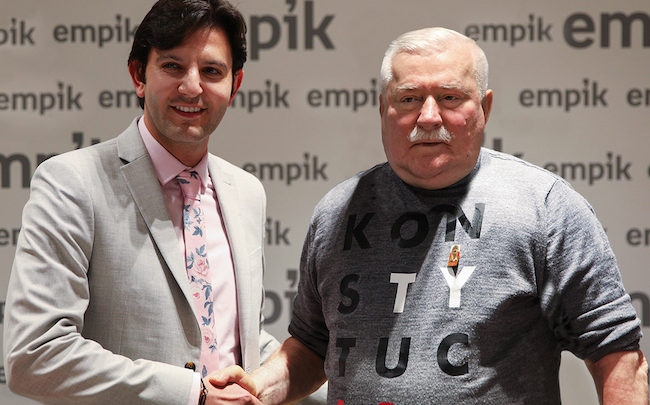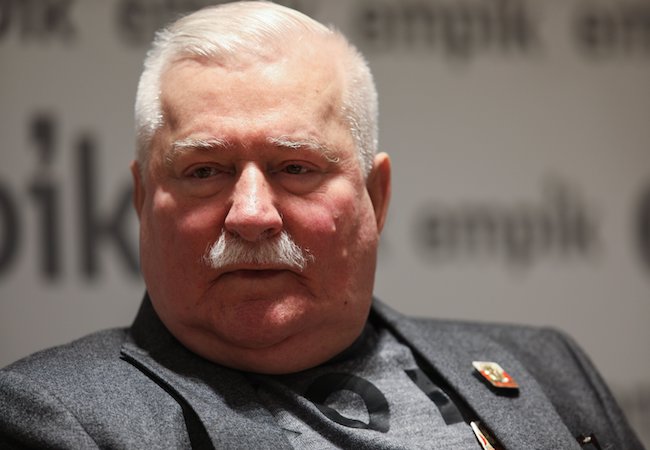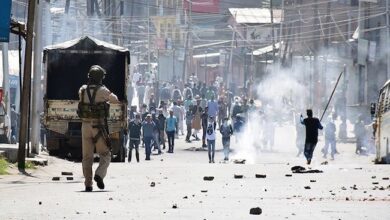Former Polish President Lech Wałęsa – Nobel Prize winning labor activist who changed the European history in an exclusive interview with Alexander Woodman

Lech Wałęsa, the leader of millions of Polish workers, became the president of Poland in 1990, and was awarded the Nobel Peace Prize in 1983. Born in Popowo (Poland), the future labor activist and political leader, began his career as a car mechanic at a machining center. As a young activist, he was among the leaders of the shipyard workers during the clash in December 1970 between the workers and the government.
Wałęsa witnessed the 1970 food price riots in Gdańsk in which police killed several demonstrators; these images remained with him forever. When new protests against Poland’s communist government erupted in 1976, Wałęsa emerged as an anti-government union activist. Eight years later, in 1978, he organized free non-communist trade unions and continued to work with other activists. Despite his constant exposure and persecution, he continued to battle forward.
Solidarity was the first not under the control of communist party trade union accepted by a Warsaw Pact country and the Eastern Bloc. Solidarity further developed on August 31, 1980, when the communist government of Poland signed the agreement allowing for its existence. By September 1980, over twenty Inter-factory Founding Committees of free trade unions merged in Congress as one body; the national organization NSZZ Solidarity. However, in December, 1981 the Polish government forced martial law, announcing the Solidarity as banned unity. The most of the leaders of the Solidarity were arrested. Lech Wałęsa was kept arrested nearly a year.

This fight continued until the economic collapse of Poland in 1988 when the government began negotiations with Lech Wałęsaand other Solidarity leaders. As a result of the Polish Round Table Talks, Solidarity received the legal status. The civil rights movement was permitted to participate in a partially free elections and to secure limited seats in the lower house (Sejm) and all in the upper house of the Parliament (Senate). In June 1989, Solidarity won the majority of the seats, thanks, in part, to the work of Lech Wałęsa.
When about ten million Polish workers and farmers joined the movement in response to this momentous agreement, the Strike Committee was transformed into a national federation of unions under the name Solidarity. In April 1990, Wałęsa was elected Chairman and spokesman of the group with 77.5% of the votes.
Solidarity was officially recognized by the Polish government, and Wałęsa led the group on its path. His journey was a combination of limited battles with the government to prevent anger and the possibility of Soviet military intervention in Poland. In late 1990, Wałęsa was unanimously elected President of the Republic of Poland and served until November, 1995.
Discussing those historical events for Poland and his journey to freedom, Lech Wałęsa often said: “Those days no one was ready to negotiate, so somebody had to. Therefore, I opened all that. Of course, later Balcerowicz financed it for us, but I did open the door. That is how it went.”
A.W. While leading a nation to freedom, some leaders are criticized quite often. What is your attitude towards this criticism and being watched by governmental authorities daily? Can you discuss any mistakes that you feel you made along your journey; anything you would have done differently?
L.W. The authorities of that era had a difficult time believing that an electrician; a blue-collar worker could achieve this success all alone. Many say he must have had some help since he would never be able to handle these responsibilities alone. Some felt that my support and assistance came from different security services. These claims just make me feel prouder of my accomplishments. Yes, I was surrounded by agents. Those who thought they could control and manipulate me. They were wrong.
Throughout this battle, I allowed no one to control me and my goals. Well, in all honesty, perhaps my wife could manipulate me a little. But, apart from her, no one else controlled me, my actions, or my decisions. I am grateful for my upbringing, which gave me a strong character, and I carried that determination to the end.
During the time of these significant changes in Poland, there were some mistakes made. That is true for any major undertaking. The mistakes were few and minor in number. More importantly, my goal was to bring freedom and democracy to Poland and its people. I succeeded.
A.W. Can you discuss the present-day political situation in Poland, in the European Union, and around the world?
L.W. You see: politics is a dirty and brutal business, which leads to a great deal of misunderstanding. Today, there are more people who write books than people who read them. And that is quite interesting. Also, it was actually by chance that the modern politicians of Poland came into power. The job ahead is to educate new politicians, who will understand the rules of the game, and use these rules to initiate and implement new projects and structures. We need to disagree fairly and fight with each other when it is needed.
We should and will make mistakes. First, we will argue and discuss our differences forcefully. Tomorrow we will use these debates to make wise choices. We must all understand and accept the fact that it is impossible to build European unity when there continues to be significant inconsistency in taxes and development. We need to balance the differences. My wish is for the world to be developed in a smarter way. We must have faith in each other and seek to explore ways to improve on such issues as poverty, unemployment, disease, and the environment, to name a few.
A.W. How would you describe the challenges you faced on your journey to the presidency? How has the world and the ruling systems changed since you became President?
L.W. Honestly, the way I followed the rules at the onset of my job, was dangerous not only for me but for the entire nation. However, there were two things that got me to this point. My success is a result of the work by our generation; they made things happen. They showed solidarity and did not give up hope. The other fact was that I had that extreme luck; the heavens were on my side and gave us a path to victory.
In those beginning days when I was just starting to learn the meaning of diplomacy, I met with representatives of the German government in Poland. When I met with the German delegation as a trade unionist, I told them “Distinguished Gentlemen; the Berlin Wall is going to fall in no time at all. Soon the Soviet Union will fall. Are you ready for that?”
Minister Genscher replied: “Sir, we would like to have problems like these. But this is not going to happen in our lifetime. By the time your words are fact; large trees would have grown on our graves.” Shortly after that, they had to immediately end their official visit to Poland and return to Germany. The Berlin Wall had fallen!! Do not draw the wrong conclusions from my story! Just have faith that the wiser you become, the higher also becomes your ability to draw conclusions from the facts.
Nowadays, you are the person who must appraise how the world has changed as we pursue our path to freedom. Years ago, the circumstances were different; there were divides, borders, and States. We worked hard to eliminate them; now, we are rebuilding them. Times have changed, and our path to success had to change, as well.
A.W. What is the main “lesson,” and “message” that you would like to deliver to the audience during your lectures at the universities and public events you attend?
L.W. I want to talk with my audience about the foundations of our construction and explain the details of our economic system. I want to teach them how we are going to cope with populism, demagogy, and the lies of politicians.
These are three specific topics that I would like to share during my speeches and lectures. As I have said, the circumstances in the past were different; the challenges were different. Today, we must find people who can bring change in accordance with the current demands of the world. Without a war; without a single gunshot taken, we have managed to liberate the world of communism. Now we must find the solutions for badly needed global solidarity.

A.W. Around the world, several countries have adopted the concept of Vision 2030; aimed to provide sustainable development and international cooperation. What are the critical determinants for global sustainability?
L.W. Discussion and negotiation are the key factors. We must find a way to achieve solutions through dialogue. An excellent example to use is the Polish Round Table Talks in 1989. This discussion was initiated by the government, and the Solidarity union, along with other opposition groups, wrote the twenty-one demands. During our discussions, we declared either these demands would be solved or we “get naughty.”
A.W. King Abdullah bin Abdulaziz Al Saud was awarded the first Lech Wałęsa prize for his contribution towards “Inter-faith dialogue, tolerance, peace, and international cooperation.” Can you please elaborate on your ideas of tolerance and inter-faith dialogue?
L.W. In the past, we used religion as a weapon to fight and at times, die. It was proper at that time, which was comprised of sharp divides and territorial wars. Nowadays, we have concluded that if we do not want to fight, religions will return to their positions. We believe that the intellect will increase and everyone will understand that there, despite the many different religions, there is just one God. The only question that remains is whether there are too many teachers which can lead to situations that are not practical or helpful to the population.
When we began our movement of Solidarity, we had a very simple idea. If you cannot remove that large stone pressing on you, ask for help from others. On the path towards freedom, the people from different societies, workers, intellectuals, young and old, religious and non-religious joined with us, and we won. To create a universal value system, we need to be surrounded by different nations, cultures, and religions. One of my goals has been to develop a system, which will allow different countries, cultures, and religions to co-exist and cooperate through understanding and accepting the differences of each of us.

A.W. When discussing the subject of religion, can you talk about the role of the Roman Catholic Church, its effect, and influence on you as you worked to become a strong a political leader in Poland?
L.W. I am a man of faith. I only fear God, and at times, my wife. In those days, each day, I would go to communion and confession once a month. In 1980, after martial law was imposed in Poland and Solidarity was outlawed, I was arrested again. In jail, my only hope was God.
For 20 years, I tried to gather people together to fight against communism. Unfortunately, only ten people followed me; two of whom were agents. Others wanted to fight against communism, but they were afraid. It was difficult for me to mobilize them.
However, the situation changed, when a Polish man became the Pope in 1978 – Pope John Paul II. When His Holiness returned to Poland, he told us not to be afraid. Within one year after his election, we gathered ten million people who supported our ideas and visions. If we ask God, if we construct everything based on our values, there is no power that can win over us.
At that time, I neither had money nor was I any wiser. I just decided that I was going on to do my job each day thoroughly and with a strong commitment. I only had two things that were of value; my faith in God, and my faith in autonomy.
Look how far I have managed to come, how much I have done, and how much better life is for my followers. The world witnessed a manifestation of faith in a communist country.
A.W. During the World Economic Forum in 2015 you said: “If we don’t give people solutions, it will awaken the demons of the past.” What are the best solutions for the current situation of world politics?
L.W. They are still awake, don’t you see? These days, thoughtful discussion is the only solution. I once said that one epoch has gone, the other has not risen yet. We are in an in-between stage. And we must discuss in detail what this world is going to look like in the future.
The economic system in the new world structure needs modifications. It should not be a communist system because it did not work for any country in the past. It should not be a capitalistic nation of the present-day world, where 10% of the world population controls 90% of its wealth. We need to find better solutions, or else the demons of the past will reawaken, and people will turn back to what they were attracted to in the past. The leaders and intellectuals must gather and discuss as many times as is necessary. This will help all of us to find better solutions and assure the people about a better world. This is the only way to avoid a new generation of extremists taking power.On reflection, I would say that the democracy of the past consisted of impressive laws. Now, we need to construct a new democracy with new rules. They must consist of clear responsibilities, along with a clear plan to move forward. I identify as a Democrat, and I represent the votes that are assigned to me. This is my responsibility. As we move along; if there is anyone who feels the need to fight; look to your left and your right. I will be at your side.
*This post contains affiliate link(s). Click here for Affiliate Disclosure.




